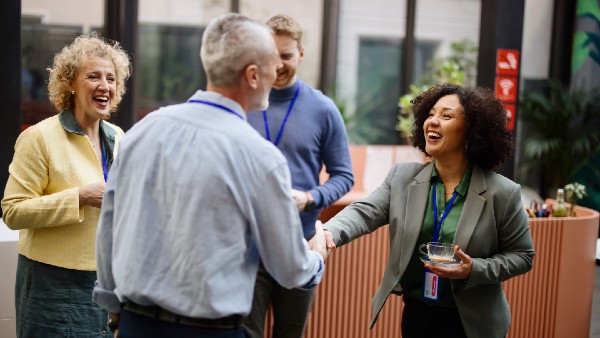If we devote attention only to our deficiencies then we miss something important.
It became commonplace in 2020 to say that Covid reveals the unvarnished reality of modern society. Much attention has been devoted to the deep holes in collective protection, a frayed social contract, and the lack of readiness of many states to respond to the pandemic. If we devote attention only to our deficiencies then we miss something important. Human societies have displayed enormous reservoirs of resilience, solidarity and adaptability in 2020. We have a stronger frame around which to attach better structures than we may have thought.
There are far worse versions of 2020 that we can imagine, deep scars though it has left behind. There wasn’t mass civil disobedience, despite anti-lockdown protests and conspiracy theories and the ideologies that drove them. The vulnerable were not left untended and deserted. Communities and local authorities came together to identify and support the vulnerable. Rapid interventions and co-operative innovation such as food hubs were established rapidly. One locality, Ceredigion, even set up a far more successful test and trace system than the nationally procured option.
We could have cut our attention off from focusing on frontline bravery in hospitals and care homes. We did not; we clapped.
Government could have failed to get cash to workers at risk of public health restriction-induced risk of redundancy but provided necessary support- for most who needed it- at scale. Disastrous ideas about ‘herd immunity’ could have been pursued even further than they were. The reality of the scale of likely deaths prevented that course of action – even if action was too often delayed.
The scientific community could have been a lot slower out of the blocks in isolating the Covid-19 genetic code and developing a test for it. They may not have found such a strong and resonant public voice. And, of course, we currently have two vaccines to have received regulatory approval with another hopefully not far behind.
And whilst some voices in the scientific community were given undue weight despite fundamental absence of evidence such as those denying a second wave likely and those assuming a greater level of ‘herd immunity’ than was the case, overall we can be relieved that the bio-medical scientific community from rapid research to acceleration of global supply chains and regulatory processes wasn’t slower.
Back in May, when George Floyd was murdered at the hands of a Minneapolis police officer, it seemed likely that this would be yet another tragic death at the hands of the police directly to be quickly forgotten. These deaths are added to those that the police had failed to stop, investigate properly or see through to prosecution. The scale of the reaction, including beyond the US itself, was enormous.
There does seem, despite predictable vocal disagreements, a widespread sense that black lives matter and anti-racism as a cause needs active intervention. Will it be different this time? Well, the millions of black voters turning out to support President-elect Biden, not least those in and around Atlanta, Georgia, may have helped make it so. This time does, at this early stage, seem to present a wider possibility for change.
Finding common ground in 2021
Looking forward to 2021 and beyond, there is plenty of commonality to build upon. A new RSA/Populus survey finds that we are greener, more embracing of diversity, demanding of greater gender, income and geographic equality and want to see deeper levels of citizen participation and democracy than much popular narrative would have us believe.
- More than half of survey respondents see increasing diversity as a good thing. Only 16 percent disagree.
- Over seven in ten believe Government should be more active in closing regional inequalities and roughly two-thirds believe the same of unequal pay between genders.
- Over half of respondents want more say over policy and by a margin of 32 percent they wish to see more powers located with local leaders.
- The public are strongly onside with the climate agenda with 68 percent wanting to see the UK hit its climate targets in the near future. Only 5 percent disagree.
There is common ground. None of this suggests that the path ahead is clear or that the storm clouds of political polarisation, economic insecurity, and social division aren’t above us. Yet, there is solid ground on which to advance.
We have learned two encouraging lessons in 2020: our capacity to innovate for public good is perhaps greater than we had imagined and the bedrock of community and solidarity is stronger. How we navigate challenges in the future will need collective will, commonality, and a commitment to innovate – not only scientifically or technologically, but socially, institutionally and democratically also.
Weak systems of governance that have failed to prepare adequately, coordinate sufficiently, or communicate effectively have been badly exposed this year. A major overhaul is required. If governance systems can be developed to see longer term possibilities, better share power across regions and with citizens and civil society directly, and eradicate corruption and patrimonialism then there is common ground and an innovative public spirit ready to be amplified. That’s a necessary but big ask.
We end 2020 knowing far more about ourselves than a year ago: what is important, what remains challenging, our strengths, our blind-spots, our limitations and our capabilities. There is no going back. For all the profound loss, sadness and despair this year has seen, real strengths have emerged. Let’s start there in 2021.
Related articles
-
Introducing the Fellowship Promotion Guide
Fellowship news
Fionna Monk
Our brand-new Fellowship Promotion Guide is a powerful new resource designed to make it easier than ever for current Fellows and staff to share the value of the RSA Fellowship with others.
-
Why 2025 is an exciting year to be an RSA Fellow
Fellowship news
Fionna Monk
Happy New Year! 2025 is shaping up to be a landmark year for the RSA Fellowship, brimming with new opportunities, initiatives, and global collaborations. There’s never been a more exciting time to be part of this dynamic and engaging community. Here’s more on why this year promises to be an inspiring and impactful year for RSA Fellows worldwide.
-
Counting the cost of bowling alone
Blog
Andy Haldane
In his 2025 CEO Lecture, Andy Haldane addresses how the ever-increasing cross-border flows of goods, people and information affect widening divisions and accelerate the depletion of social capital.




Be the first to write a comment
Comments
Please login to post a comment or reply
Don't have an account? Click here to register.